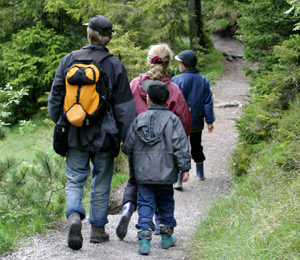Prepare to Enjoy the Wilderness
Posted on Jul 7, 2012
By St. Luke's, Duluth MN

If you’ve ever hiked the Superior Hiking Trail, biked along the North Shore or camped in the Boundary Waters Canoe Area, you know how unpredictable nature can be. But by planning ahead and packing for emergencies, it’s possible to fully enjoy everything the wilderness has to offer, says emergency medical physician Cynthia Haensel, MD,
St. Luke’s Emergency Services.
Real-world experience
Dr. Haensel speaks from first-hand experience. In addition to being a seasoned fly fishing instructor and outdoor guide, she teaches classes on wilderness safety and basic first aid for the American Red Cross. “Before you go, make sure you know exactly where you’re going, check the weather forecast and learn about the environmental conditions,” she says. “It pays to invest in a good map, a compass and a first aid kit, and to familiarize yourself with those tools before you hit the trail.”
Expect the unexpected
The kit should be stocked with clean bandages, sterile gauze, medical tape, scissors and blister patches, she says, adding that blisters are the most common wilderness injury. “And be sure to check the expiration date on the ibuprofen and any other medications you need.” Other must-haves on Dr. Haensel’s list are an EpiPen for severe allergic reactions with anaphylaxis, a broad-spectrum sunscreen and DEET-based insect repellent. For additional protection from insects, she suggests pretreating outdoor clothing with Permethrin and letting them dry for 24 hours before packing them. Finally, place everything inside a waterproof container, such as a large water bottle, to keep the contents dry.
“Even if you’re going on a day hike, plan to spend an additional 12 hours in the wilderness,” Dr. Haensel says. “Which means packing layers of clothes, backup meals and snacks, and a way to purify water.”
Dr. Haensel’s wilderness safety tips at a glance:
- Always travel with a friend or buddy.
- Find out about the area and the weather.
- Trust your map and compass.
- Learn basic first aid and pack a first aid kit.
- Carry plenty of water, water purification tablets and food.
- Pack a flashlight, batteries, candle, waterproof matches, pocketknife, insect repellent, sunglasses and sunscreen.
- Plan for sudden changes in weather.
- Watch for slippery patches, tree roots, rocks and poisonous plants.
- Have fun!
Categories: